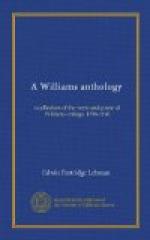“Good-bye, professor,” she said. “I thought you wouldn’t mind if ...” She hesitated. The professor thought she looked rather pitiful and thin and tired.
“No, Jane,” he answered quietly. “You are not to go. I don’t suppose you will understand, but my dreams have all gone—and the vision has come. And I need you, Jane.”
“Then you forgive me?” she said tremulously. “I did not know ...”
“There is nothing to forgive, Jane. I did not know, either.”
Jane broke down and the professor rose and put his arms around her, awkwardly, and kissed her. He had not kissed her in years. They sat down together before the hearth and gazed into the blackened ashes. He held her hand in his. Finally she spoke. She almost understood—
“Shall we have apple dumplings for supper, professor? The kind you used to like?” She was smiling now.
“No, Jane,” he said gravely, “we’ll have peach preserves.”
Literary Monthly, 1909.
THE GOOD GREY POET
SONNET
EDWIN PARTRIDGE LEHMAN ’10
All men must feel the beauty of a star
That rides in the illimitable space
Of heav’n; the beauty of an Helen’s
face;
Or of a woodland water, glimpsed afar,
Where haze-empurpled meadows, undefined
And slumbrous, intervene; of quiet, cool,
Sequester’d glades, where in the
level pool
The long green rushes dip before the wind.
These all men feel. But three times
blessed he
Whose eye and ear, of finer fibre spun,
Sense the elusive thread of beauty, where
The common man hath deemed that none can
be.
The beauty of the commonplace is one
In substance with the beauty of the rare.
Literary Monthly, 1910.
A MINOR POET TO HIMSELF
SONNET
EDWIN PARTRIDGE LEHMAN ’10
We lesser poets clothe in garb ornate,
In words of dizzy fire, in awkward phrase,
In humble thunderings, that only daze,
Though meant to rouse in flames of love
or hate,
The thoughts that those brave souls of
stuff divine,
Whose words breathe inspiration, have
long since
In jewelled lines set forth. Where
we bear hints
Of grape, they bear the ruddy full-pressed
wine.
And yet the fire that thrills us is no
less,
Nor coarser, than the fire that they,
the great,
Have felt. Our pens are feebler;
but the play
Of deep emotions, the fine stir and stress
That mark the soul’s rare movements,
are, in state,
Equal to those of lines that make men
pray.
Literary Monthly, 1909.
HEARTS AND TARTS
AN OLD TALE RETOLD




